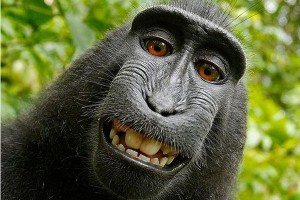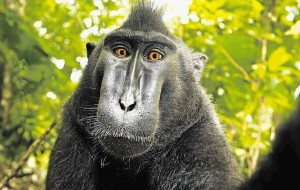Copyright is Monkey Business
As writers, we worry about our work being reproduced without our consent. We Google ourselves to find out whether a publication or industry association or corporation newsletter is running one of our articles without contacting us and inquiring about a fee. Well, that challenge seems simple compared to the case of the professional photographer and an endangered crested black macaque in Indonesia. In 2011, a curious female macaque took the photographer’s camera and snaps “selfies.” Later, one of the images is uploaded to Wikipedia Commons. The photographer cries foul, claiming the image is subject to copyright & he’s being denied royalties by its illegal reproduction. (The photographer’s argument: although the macaque depressed the shutter multiple times, he had first set up the lighting conditions and had the camera available, therefore the macaque was technically acting as a kind of photographer’s assistant.)
Finally, on August 19, the U.S. Copyright Office (USCO) confirmed that to be eligible to register an original piece of intellectual property, the creator has to be human. “The Office will not register works produced by nature, animals or plants.” Need more clarificaltion? The USCO specifies a “selfie” taken by a monkey would be no more eligible than a “mural painted by an elephant” or a claim based on “driftwood that has been shaped and smoothed by the ocean.” (Ghosts and spirits are similarly ineligible, as is a work created by a machine without human intervention.) In short, to claim copyright a human being has to have had an artistic hand in the process, in this case by having significantly modified the macque’s image (not just doing a minor touch-up, like balancing the colour).
It’s a modern variation on the “infinite monkey theorem,” which proposes that a monkey hitting random keys on a keyboard for an infinite period would sooner or later produce the complete works of Shakespeare or [insert other famous author of your choice]. Most (human) writers are uncomfortable with that theorem, but in this case surely we all agree the royalties should be going to the macaque, not the photographer. It is, after all, monkey business.

